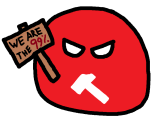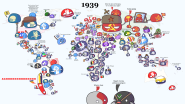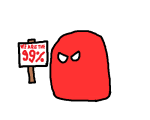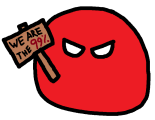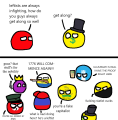No edit summary |
No edit summary |
||
| Line 1: | Line 1: | ||
{{ImportantIRL}} | {{ImportantIRL}} | ||
{{Ideology | {{Ideology | ||
|title=[[File:Soc-h.png]] '''Socialism''' [[File: | |title=[[File:Soc-h.png]] '''Socialism''' [[File:Soc.png]] | ||
|image=May1stTributeAlt.png | |image=May1stTributeAlt.png | ||
|caption="Stand up, all victims of oppression!" | |caption="Stand up, all victims of oppression!" | ||
Revision as of 06:18, 17 December 2023
 |
This page is about an important IRL ideology "This knowledge is essential to political science!" - Scientocracy This page is about an ideology that not only exists in the real world, but is also of reasonable importance. Please do not make major edits to this page without citing sources, so that it may stay accurate. |
"Only in a socialist system are the interests of the individual, the state and the collective at one."
Socialism is an ideology used to represent the broad range of ideologies that fall under the umbrella term of "Socialism". In the classical sense, socialism describes worker-owned means of production combined with egalitarianism, heavily supporting worker co-ops, self-management, economic planning, and/or workplace democracy depending on the variant. The modern definition of the word socialism, popularised by European Error creating thumbnail: Unable to save thumbnail to destination Social Democrats, and the Error creating thumbnail: Unable to save thumbnail to destination Democratic Socialists of America, is "any of various economic and political theories advocating collective or governmental ownership and administration of the means of production and distribution of goods." Socialism in the modern age advocates workers' self-management, high taxation on the wealthy and/or nationalisation over key parts of industry. Socialism is always economically left, and culturally neutral however has found itself becoming synonymous with progressivism mostly in the west at the most recent times. But you do get ideologies like Error creating thumbnail: Unable to save thumbnail to destination Conservative Socialism and more extreme ones like Error creating thumbnail: Unable to save thumbnail to destination Strasserism and Error creating thumbnail: Unable to save thumbnail to destination National Bolshevism, that combine Socialist economics, with conservative cultural preservation, due to their shared Error creating thumbnail: Unable to save thumbnail to destination Populist standpoint.
History (WIP)
Socialism as a political movement is rooted in the French Revolution and Error creating thumbnail: Unable to save thumbnail to destination Jacobinism, although notable proto-socialist figures and movements existed before this. The first socialist thinkers were social critics and philosophers of the 19th century from Western Europe. These socialist thinkers followed what would later be dubbed, by Karl Marx and Friedrich Engels, Error creating thumbnail: Unable to save thumbnail to destination Utopian Socialism, due to their lack of materialist analysis and bourgeois nature. Among these thinkers were Charles Fourier, Henri de Saint-Simon, and Robert Owen. Despite all these thinkers being considered Utopian Socialists, their philosophies differed greatly in many ways, with Owen's ideology resembling Socialism in the modern sense more so than the other two.
Robert Owen would go on to develop several socialist communes and villages, being the first to attempt to actualize a socialist society, though these projects were often on a small scale and subject to much criticism.
In France, during the first half of the 19th century, socialist philosophers and politicians continued to popularize socialism. It is in France during this time that many socialists started to reject the gradualism and utilization of utopian communes of the older Utopian Socialists. The term "socialism" was first used in a French Utopian Socialist newspaper. There also emerged a Error creating thumbnail: Unable to save thumbnail to destination Christian Socialist movement in France led by Philippe Buchez. Moreover, during this time, French socialist literature, which would prove to be highly consequential, was being published, most notably What Is Property? by Error creating thumbnail: Unable to save thumbnail to destination Pierre-Joseph Proudhon.
In the 19th century, Error creating thumbnail: Unable to save thumbnail to destination Anarchism as a movement arose and was incorporated into the socialist movement. This is seen with thinkers such as the aforementioned Pierre-Joseph Proudhon, whose socialistic anarchism was market-oriented, as well as with more communistic anarchists, like the Russian Mikhail Bakunin, who sought a Error creating thumbnail: Unable to save thumbnail to destination collectivist anarchist society which would utilize labor vouchers, as well as the prominent Error creating thumbnail: Unable to save thumbnail to destination anarchist communist Peter Kropotkin, who sought a completely communistic society, devoid of any form of currency whatsoever. Anarchism when combined with socialist principles would later come to be known as Error creating thumbnail: Unable to save thumbnail to destination Social Anarchism.
Error creating thumbnail: Unable to save thumbnail to destination Marxism, which arose from Karl Marx and Friedrich Engels, became the most influential socialist philosophy in history. Marx and Engels ideas on philosophy, political economy, sociology and history were influenced primarily by Error creating thumbnail: Unable to save thumbnail to destination George Wilhelm Friedrich Hegel, Error creating thumbnail: Unable to save thumbnail to destination classical economists such as Error creating thumbnail: Unable to save thumbnail to destination Adam Smith and Error creating thumbnail: Unable to save thumbnail to destination David Ricardo, the earlier utopian socialists, and socialist ideals which arose in revolutionary France. Marx and Engels devised a materialist philosophy of history known as Error creating thumbnail: Unable to save thumbnail to destination historical materialism and called their form of socialism "scientific socialism" in contrast with utopian socialism. Marxism differed from Utopian Socialism in that it viewed history as a series of class struggles, and saw moving towards socialism within capitalism as futile, instead advocating for revolution.
Variants
Error creating thumbnail: Unable to save thumbnail to destination Progressive Conservative Socialism Error creating thumbnail: Unable to save thumbnail to destination
Progressive Conservative Socialism is the Error creating thumbnail: Unable to save thumbnail to destination progressive conservative version of Error creating thumbnail: Unable to save thumbnail to destination socialism. It is culturally moderate and supports the idea that both Error creating thumbnail: Unable to save thumbnail to destination progressivism and Error creating thumbnail: Unable to save thumbnail to destination conservatism and elements in them that are needed for society to prosper. This cultural model can be seen with Error creating thumbnail: Unable to save thumbnail to destination 21st Century Socialism.
Error creating thumbnail: Unable to save thumbnail to destination Progressive Socialism
Error creating thumbnail: Unable to save thumbnail to destination Revolutionary Socialism
Revolutionary socialism is a political philosophy, doctrine, and tradition within socialism that stresses the idea that a social revolution is necessary to bring about structural changes in society. More specifically, it is the view that revolution is a necessary precondition for transitioning from a capitalist to a socialist mode of production. Revolution is not necessarily defined as a violent insurrection; it is defined as a seizure of political power by mass movements of the working class so that the state is directly controlled or abolished by the working class as opposed to the capitalist class and its interests. It encompasses many movements, such as movements based on Error creating thumbnail: Unable to save thumbnail to destination orthodox Marxist theory such as Error creating thumbnail: Unable to save thumbnail to destination De Leonism, Error creating thumbnail: Unable to save thumbnail to destination impossibilism and Error creating thumbnail: Unable to save thumbnail to destination Luxemburgism, as well as movements based on Error creating thumbnail: Unable to save thumbnail to destination Leninism and the theory of Error creating thumbnail: Unable to save thumbnail to destination vanguardist-led revolution such as Error creating thumbnail: Unable to save thumbnail to destination Maoism, Error creating thumbnail: Unable to save thumbnail to destination Marxism–Leninism and Error creating thumbnail: Unable to save thumbnail to destination Trotskyism. Revolutionary socialism also includes other Marxist, Marxist-inspired and non-Marxist movements such as those found in Error creating thumbnail: Unable to save thumbnail to destination democratic socialism, Error creating thumbnail: Unable to save thumbnail to destination revolutionary syndicalism, Error creating thumbnail: Unable to save thumbnail to destination anarchism and Error creating thumbnail: Unable to save thumbnail to destination social democracy.
Revolutionary socialism is contrasted with reformist socialism, especially the reformist wing of Error creating thumbnail: Unable to save thumbnail to destination social democracy and other evolutionary approaches to socialism and is opposed to social movements that seek to gradually ameliorate capitalism's economic and social problems through Error creating thumbnail: Unable to save thumbnail to destination political reform.
Error creating thumbnail: Unable to save thumbnail to destination Lassalleism
State
In contrast with Marx and his adherents, Lassalle rejected the idea that the state was a class-based power structure with the function of preserving existing class relations and destined to wither away in a future classless society. Instead, Lassalle considered the state as an independent entity, an instrument of justice essential for the achievement of the socialist program.[41]
Iron law of wages
Lassalle accepted the idea first posited by the classical economist David Ricardo that wage rates in the long term tended towards the minimum level necessary to sustain the life of the worker and to provide for his reproduction. In accord with the law of rent, Lassalle coined his own iron law of wages. Lassalle argued that individual measures of self-help by wage workers were destined to failure and that only producers' cooperatives established with the financial aid of the state would make economic improvement of the workers' lives possible.[42] From this, it followed that the political action of the workers to capture the power of the state was paramount and the organization of trade unions to struggle for ephemeral wage improvements is more or less a diversion from the primary struggle.
Philosophy
Lassalle considered Johann Gottlieb Fichte as "one of the mightiest thinkers of all peoples and ages", praising Fichte's Addresses to the German Nation in a May 1862 speech as "one of the mightiest monuments of fame which our people possesses, and which, in depth and power, far surpass everything of this sort which has been handed down to us from the literature of all time and peoples".[43]
Personality
Soc is usually portrayed as a stereotypical industrial-era unionized worker who really loves striking against Error creating thumbnail: Unable to save thumbnail to destination his boss and usually will follow the personality traits of the various types of socialism portrayed.
How to Draw
Socialism's design is a unicolor of red, associated with Socialism, and a white hammer in the middle symbolizing labor. This is essentially a distinctive form of "The Red Flag".

- Draw a ball.
- Color the ball red
- Add a white hammer in the center.
- Draw eyes on the ball.
And you're done!
| Color Name | HEX | RGB | |
|---|---|---|---|
| Red | #FF0000 | 255, 0, 0 | |
| White | #FFFFFF | 255, 255, 255 | |
Relationships
Workers
- Error creating thumbnail: Unable to save thumbnail to destination Marxism - My most famous son who shares many of my ideals.
- Error creating thumbnail: Unable to save thumbnail to destination Utopian Socialism - My mom is idealistic for her time. She also influenced me greatly!
- Error creating thumbnail: Unable to save thumbnail to destination Jacobinism - Dad!
- Error creating thumbnail: Unable to save thumbnail to destination Democratic Socialism - My reformist son who loves democracy and freedom.
- Error creating thumbnail: Unable to save thumbnail to destination Conservative Socialism - My culturally conservative son.
- Error creating thumbnail: Unable to save thumbnail to destination Arab Socialism - My most successful Arabic son!
- Error creating thumbnail: Unable to save thumbnail to destination African Socialism - MAGA: Make Africa Great Again!
- Error creating thumbnail: Unable to save thumbnail to destination Guild Socialism - Likes guilds as opposed to labor unions or vanguard parties but otherwise fine.
- Error creating thumbnail: Unable to save thumbnail to destination Religious Socialism - My religious child.
- Error creating thumbnail: Unable to save thumbnail to destination Eco-Socialism - One of my most popular variants. We gotta DEFEND THE EARTH!
- Error creating thumbnail: Unable to save thumbnail to destination Social Anarchism - My grandson who disrespects all authority.
- Error creating thumbnail: Unable to save thumbnail to destination Minarcho-Socialism - Same as above but moderate.
- Error creating thumbnail: Unable to save thumbnail to destination Libertarian Socialism - My child disrespects all authority but doesn't want to completely abolish it.
- Error creating thumbnail: Unable to save thumbnail to destination State Socialism - My state loving son.
I just wish people stop saying that we have zero differences. - Error creating thumbnail: Unable to save thumbnail to destination Market Socialism - My friend who likes markets but doesn’t like Error creating thumbnail: Unable to save thumbnail to destination Capitalism.
- Error creating thumbnail: Unable to save thumbnail to destination Libertarian Market Socialism - Same as above two
- Error creating thumbnail: Unable to save thumbnail to destination Titoism - Same as Market Socialism. Also, the next time a fascist tells you to get in a helicopter, remind them of the cuck pit.
- Error creating thumbnail: Unable to save thumbnail to destination Monarcho-Socialism - All hail the people's king!
- Error creating thumbnail: Unable to save thumbnail to destination Mutualism - Property is Theft! Creator of industrial democracy.
- Error creating thumbnail: Unable to save thumbnail to destination Maoism - The cultural revolution was excellent. Maybe it went too far, but a great inspiration nonetheless.
- Error creating thumbnail: Unable to save thumbnail to destination Liberal Socialism - My son who upholds civil rights.
- Error creating thumbnail: Unable to save thumbnail to destination Alter-Globalism - Yes! Another world is possible!
- Error creating thumbnail: Unable to save thumbnail to destination National Bolshevism - Many of my early thinkers didn't like the Jews either.
You are quite crazy though - Error creating thumbnail: Unable to save thumbnail to destination Syndicalism - Striking is based but try to help nonunionized workers too.
- Error creating thumbnail: Unable to save thumbnail to destination Anarcho-Syndicalism - Above but anarchist.
Mixed
- Error creating thumbnail: Unable to save thumbnail to destination Yellow Socialism - Workers can work with businesses to advance socialism.
- Error creating thumbnail: Unable to save thumbnail to destination Reactionary Socialism - Workers can work with aristocrats to advance socialism.
- Error creating thumbnail: Unable to save thumbnail to destination Anarcho-Egoism - You raise some valid points against capitalism, but then you complain about some of us being "dogmatic".
- Error creating thumbnail: Unable to save thumbnail to destination Welfarism - People think I'm you because you care much for the poor, but you can only exist in capitalist societies. You also could go further.
- Error creating thumbnail: Unable to save thumbnail to destination Distributism - So close to perfection. Just drop the whole private property thing and we're good.
- Error creating thumbnail: Unable to save thumbnail to destination Left-Wing Nationalism - You often have good stances on things like imperialism and the means of production but some of you are too moderate, xenophobic and not socialist at all.
- Error creating thumbnail: Unable to save thumbnail to destination Social Democracy - We have a complicated relationship. He thinks it's better to reform capitalism than to get rid of it, and nowadays a lot of people, especially in the US, think he's me even though we're not the same. But I can't blame them for that. After all, we both have similar values... you are better than the guy above though.
- Error creating thumbnail: Unable to save thumbnail to destination Marxism-Leninism - Another complicated relationship. With the opposite problem of the guy above who thinks a single vanguard party can industrialise the country and world while proving the conditions for worker ownership to be realised despite the bureaucracy that always derails him. But I can't blame him for that considering how much communists and socialists are despised and kept out of power through nefarious means.
- Error creating thumbnail: Unable to save thumbnail to destination Nordic Model - Same as Socdem.
Olof Palme was based though. - Error creating thumbnail: Unable to save thumbnail to destination Globalism - I don't like the unregulated international trade thing, but I like when you help the third world and I also like Error creating thumbnail: Unable to save thumbnail to destination Socialist Internationalism and Error creating thumbnail: Unable to save thumbnail to destination Alter-Globalism.
- Error creating thumbnail: Unable to save thumbnail to destination Strasserism - Don't know about the anti-semitism. But at least you're better than Error creating thumbnail: Unable to save thumbnail to destination him.
- Error creating thumbnail: Unable to save thumbnail to destination Capitalist Communism - My weird child.
I knew I shouldn't have invited Capitalism to my party. - Error creating thumbnail: Unable to save thumbnail to destination Kemalism - We never forget Kadroist comrades.
- Error creating thumbnail: Unable to save thumbnail to destination Tridemism - We never forget Dr. Sun Yat-sen and Left KMT comrades. It's a shame that the modern-day KMT is full of capitalists.
- Error creating thumbnail: Unable to save thumbnail to destination Neosocialism - "For though they offer us concessions, change will not come from above!" --- Part of 'The Internationale'.
- Error creating thumbnail: Unable to save thumbnail to destination Republicanism - Most of my variants and offspring support you but you can also be quite liberal at times.
- Error creating thumbnail: Unable to save thumbnail to destination Progressivism - Most of my variants support at least most of you, and we both love equality. But we have also had fairly large bouts too.... and also, stop hanging out with the liberals, please...
Oppressors
- Error creating thumbnail: Unable to save thumbnail to destination Capitalism - GIVE ME A GODDAMN RAISE YOU STUPID PIG!
- Error creating thumbnail: Unable to save thumbnail to destination Liberalism - Yes, liberty, equality and fraternity, but still, YOU STILL SERVE AS THE MINDSET OF THE CAPITALISTS!
- Error creating thumbnail: Unable to save thumbnail to destination Social Liberalism - You aren't that bad in America, but still serve the capitalist mindset.
- Error creating thumbnail: Unable to save thumbnail to destination Classical Liberalism - Bourgeoise revolutionary!
- Error creating thumbnail: Unable to save thumbnail to destination Social Authoritarianism - Your welfare just weakens the proletariat while keeping them enthralled.
- Error creating thumbnail: Unable to save thumbnail to destination Social Capitalism - Same as above, but more liberal.
- Error creating thumbnail: Unable to save thumbnail to destination State Capitalism - GIVE ME A GODDAMN... wait, you again? I can't believe some people mistake you for me or Error creating thumbnail: Unable to save thumbnail to destination him, do we really look that much alike?!
- Error creating thumbnail: Unable to save thumbnail to destination Juche - Wait, how are we even related?
- Error creating thumbnail: Unable to save thumbnail to destination Fascism - I can't believe that you betrayed us, Benito. Fuck off already, you oppressive pig.
We both like George Sorel Error creating thumbnail: Unable to save thumbnail to destination though, and nationalizing over 70% of the industry is based ngl. - Error creating thumbnail: Unable to save thumbnail to destination National "Socialism" - GERMAN FASCIST WHO STOLE MY FUCKING NAME!
I mean "socialism" for the Aryans only?You're the worst of them all! - Error creating thumbnail: Unable to save thumbnail to destination Anarcho-Capitalism - FUCK OFF!!! YOU'RE NOT EVEN AN ANARCHIST!!!
- Error creating thumbnail: Unable to save thumbnail to destination Dengism - What is this? Deng, you are a dirty red capitalist. Also why is there such a high-income gap!?
But it is still fun to use you to trigger capitalists in the west. - Error creating thumbnail: Unable to save thumbnail to destination Pol Potism - The black sheep of the family. You literally made a lot of people scared of me! You disgust me and bring shame upon our family!
- Error creating thumbnail: Unable to save thumbnail to destination Neoliberalism - Oh so I'M the one who hates the poor? You literally think that the British colonizing India was good. I'll see myself out on this one.
- Error creating thumbnail: Unable to save thumbnail to destination Plutocracy - EAT THE RICH!
- Error creating thumbnail: Unable to save thumbnail to destination WHAT? You want to eat me?
- Error creating thumbnail: Unable to save thumbnail to destination NO, I don't. "Eat the rich" is just an anti-capitalist slogan anyways and I don't want to literally eat you!
- Error creating thumbnail: Unable to save thumbnail to destination Corporatocracy - My worst nightmare…
- Error creating thumbnail: Unable to save thumbnail to destination Reactionaryism & Error creating thumbnail: Unable to save thumbnail to destination Feudalism - FUCK YOU BOTH FOR WHAT YOU DO TO WORKERS! I AM NEVER BEING A SERF AGAIN!
- Error creating thumbnail: Unable to save thumbnail to destination Libertarianism - Socialism is neither "when welfare" nor "when the government", you schizo! You also stole Error creating thumbnail: Unable to save thumbnail to destination their name!
- Error creating thumbnail: Unable to save thumbnail to destination Authoritarian Capitalism - Proof that Error creating thumbnail: Unable to save thumbnail to destination liberal “democracies” are nothing more than dictatorships controlled by capitalists.
- Error creating thumbnail: Unable to save thumbnail to destination Thatcherism - Ding dong the witch is dead!
- Error creating thumbnail: Unable to save thumbnail to destination Third Way - STOP CORRUPTING EVERY EUROPEAN LEFT-WING PARTY YOU Error creating thumbnail: Unable to save thumbnail to destination NEOLIBERAL SCUM!
- Error creating thumbnail: Unable to save thumbnail to destination Eco-Capitalism - “Eco-Friendly Capitalism.” What an actual joke.
- Error creating thumbnail: Unable to save thumbnail to destination Neoconservatism - You have the audacity to call me an oppressor while you overthrow democratically elected socialists and install capitalist tyrants around the world.
- Error creating thumbnail: Unable to save thumbnail to destination National Syndicalism - Proletariat reactionary!
- Error creating thumbnail: Unable to save thumbnail to destination Chiang Kai-shek Thought - WHY THE HELL DID YOU HAVE TO MURDER LEFT KUOMINTANG MEMBERS???
What do you mean, you're a Socialist?
Further Information
Literature
- Das Kapital Volumes One, Two and Three by Error creating thumbnail: Unable to save thumbnail to destination Karl Marx
- Evolutionary Socialism by Error creating thumbnail: Unable to save thumbnail to destination Eduard Bernstein
- Why Socialism? by Error creating thumbnail: Unable to save thumbnail to destination Albert Einstein
- Imperialism: The Highest Stage of Capitalism by Error creating thumbnail: Unable to save thumbnail to destination Vladimir Lenin
- The Accumulation of Capital by Error creating thumbnail: Unable to save thumbnail to destination Rosa Luxemburg
- It's Time For Real Change: For the Many Not the Few by The U.K. Labour Party under the Leadership of Error creating thumbnail: Unable to save thumbnail to destination Jeremy Corbyn
- The Soul of Man Under Socialism by Error creating thumbnail: Unable to save thumbnail to destination Oscar Wilde
- Understanding Socialism by Error creating thumbnail: Unable to save thumbnail to destination Richard D. Wolff
- After Liberalism by Immanuel Wallerstein
- Bullshit Jobs by Error creating thumbnail: Unable to save thumbnail to destination David Graeber
- The Utopia of Rules: On Technology, Stupidity, and the Secret Joys of Bureaucracy by Error creating thumbnail: Unable to save thumbnail to destination David Graeber
- Acts of Resistance: Against the Tyranny of the Market by Pierre Bourdieu
- J IS FOR JUNK ECONOMICS: A Guide To Reality In An Age Of Deception by Michael Hudson
- The Establishment: And how they get away with it by Error creating thumbnail: Unable to save thumbnail to destination Owen Jones
- A People's History of the United States by Error creating thumbnail: Unable to save thumbnail to destination Howard Zinn
Wikipedia
- Socialism
- History of Socialism
- Types of Socialism
- Economic Planning
- Workplace Democracy
- Socialist State
- The Red Flag
- Socialist Parties
- Category: Socialism
People
- Error creating thumbnail: Unable to save thumbnail to destination Phillipp Mainländer Error creating thumbnail: Unable to save thumbnail to destination
- Error creating thumbnail: Unable to save thumbnail to destination Karl Marx Error creating thumbnail: Unable to save thumbnail to destination
- Error creating thumbnail: Unable to save thumbnail to destination Friedrich EngelsError creating thumbnail: Unable to save thumbnail to destination
- Error creating thumbnail: Unable to save thumbnail to destination Louis Charles Delescluze Error creating thumbnail: Unable to save thumbnail to destination
- Error creating thumbnail: Unable to save thumbnail to destination Eduard Bernstein Error creating thumbnail: Unable to save thumbnail to destination
- Error creating thumbnail: Unable to save thumbnail to destination Error creating thumbnail: Unable to save thumbnail to destination Jarosław Dąbrowski Error creating thumbnail: Unable to save thumbnail to destination
- Error creating thumbnail: Unable to save thumbnail to destination Error creating thumbnail: Unable to save thumbnail to destination Vladimir Lenin Error creating thumbnail: Unable to save thumbnail to destination
- Error creating thumbnail: Unable to save thumbnail to destination Error creating thumbnail: Unable to save thumbnail to destination Leon Trotsky Error creating thumbnail: Unable to save thumbnail to destination
- Error creating thumbnail: Unable to save thumbnail to destination Error creating thumbnail: Unable to save thumbnail to destination Joseph Stalin Error creating thumbnail: Unable to save thumbnail to destination
- Error creating thumbnail: Unable to save thumbnail to destination Error creating thumbnail: Unable to save thumbnail to destination Julius Martov Error creating thumbnail: Unable to save thumbnail to destination
- Error creating thumbnail: Unable to save thumbnail to destination Ernst Thälmann Error creating thumbnail: Unable to save thumbnail to destination
- Error creating thumbnail: Unable to save thumbnail to destination Error creating thumbnail: Unable to save thumbnail to destination Rosa Luxemburg Error creating thumbnail: Unable to save thumbnail to destination
- Error creating thumbnail: Unable to save thumbnail to destination Sun Yat-sen Error creating thumbnail: Unable to save thumbnail to destination
- Error creating thumbnail: Unable to save thumbnail to destination Clement Attlee Error creating thumbnail: Unable to save thumbnail to destination
- Error creating thumbnail: Unable to save thumbnail to destination Mao Zedong Error creating thumbnail: Unable to save thumbnail to destination
- Error creating thumbnail: Unable to save thumbnail to destination Zhou Enlai Error creating thumbnail: Unable to save thumbnail to destination
- Error creating thumbnail: Unable to save thumbnail to destination Kim Dynasty Error creating thumbnail: Unable to save thumbnail to destination
- Error creating thumbnail: Unable to save thumbnail to destination Josip Broz Tito Error creating thumbnail: Unable to save thumbnail to destination
- Error creating thumbnail: Unable to save thumbnail to destination Enver Hoxha Error creating thumbnail: Unable to save thumbnail to destination
- Error creating thumbnail: Unable to save thumbnail to destination Error creating thumbnail: Unable to save thumbnail to destination Nikita Khrushchev File:NikitaKhrushchev.png
- Error creating thumbnail: Unable to save thumbnail to destination Error creating thumbnail: Unable to save thumbnail to destination Georgy Malenkov Error creating thumbnail: Unable to save thumbnail to destination
- Error creating thumbnail: Unable to save thumbnail to destination Error creating thumbnail: Unable to save thumbnail to destination Mikhail Suslov Error creating thumbnail: Unable to save thumbnail to destination
- Error creating thumbnail: Unable to save thumbnail to destination Error creating thumbnail: Unable to save thumbnail to destination Lyudmila Pavlichenko Error creating thumbnail: Unable to save thumbnail to destination
- Error creating thumbnail: Unable to save thumbnail to destination Fidel Castro Error creating thumbnail: Unable to save thumbnail to destination
- Error creating thumbnail: Unable to save thumbnail to destination Raul Castro Error creating thumbnail: Unable to save thumbnail to destination
- Error creating thumbnail: Unable to save thumbnail to destination Che Guevara Error creating thumbnail: Unable to save thumbnail to destination
- Error creating thumbnail: Unable to save thumbnail to destination Ho Chi Minh Error creating thumbnail: Unable to save thumbnail to destination
- Error creating thumbnail: Unable to save thumbnail to destination Kaysone Phomvihane Error creating thumbnail: Unable to save thumbnail to destination
- Error creating thumbnail: Unable to save thumbnail to destination Pol Pot Error creating thumbnail: Unable to save thumbnail to destination
- Error creating thumbnail: Unable to save thumbnail to destination Erich Honecker Error creating thumbnail: Unable to save thumbnail to destination
- Error creating thumbnail: Unable to save thumbnail to destination Error creating thumbnail: Unable to save thumbnail to destination Leonid Brezhnev Error creating thumbnail: Unable to save thumbnail to destination
- Error creating thumbnail: Unable to save thumbnail to destination Alexander Dubček Error creating thumbnail: Unable to save thumbnail to destination Error creating thumbnail: Unable to save thumbnail to destination
- Error creating thumbnail: Unable to save thumbnail to destination Gustav Husak Error creating thumbnail: Unable to save thumbnail to destination
- Error creating thumbnail: Unable to save thumbnail to destination Mátyás Rákosi Error creating thumbnail: Unable to save thumbnail to destination
- Error creating thumbnail: Unable to save thumbnail to destination János Kádár Error creating thumbnail: Unable to save thumbnail to destination
- Error creating thumbnail: Unable to save thumbnail to destination Nicolae Ceaușescu Error creating thumbnail: Unable to save thumbnail to destination
- Error creating thumbnail: Unable to save thumbnail to destination Khorloogiin Choibalsan Error creating thumbnail: Unable to save thumbnail to destination
- Error creating thumbnail: Unable to save thumbnail to destination Muammar Gaddafi Error creating thumbnail: Unable to save thumbnail to destination
- Error creating thumbnail: Unable to save thumbnail to destination Gamal Abdel Nasser Error creating thumbnail: Unable to save thumbnail to destination
- Error creating thumbnail: Unable to save thumbnail to destination Bhagat Singh Error creating thumbnail: Unable to save thumbnail to destination
- Error creating thumbnail: Unable to save thumbnail to destination Mahatma Gandhi Error creating thumbnail: Unable to save thumbnail to destination
- Error creating thumbnail: Unable to save thumbnail to destination Jawaharlal Nehru Error creating thumbnail: Unable to save thumbnail to destination
- Error creating thumbnail: Unable to save thumbnail to destination Sukarno Error creating thumbnail: Unable to save thumbnail to destination
- Error creating thumbnail: Unable to save thumbnail to destination Luis Taruc Error creating thumbnail: Unable to save thumbnail to destination
- Error creating thumbnail: Unable to save thumbnail to destination Lean Alejandro Error creating thumbnail: Unable to save thumbnail to destination
- Error creating thumbnail: Unable to save thumbnail to destination Sanzo Nosaka Error creating thumbnail: Unable to save thumbnail to destination
- Error creating thumbnail: Unable to save thumbnail to destination Inejiro Asanuma Error creating thumbnail: Unable to save thumbnail to destination
- Error creating thumbnail: Unable to save thumbnail to destination Tetsu Katayama Error creating thumbnail: Unable to save thumbnail to destination
- Error creating thumbnail: Unable to save thumbnail to destination Michel Aflaq Error creating thumbnail: Unable to save thumbnail to destination
- Error creating thumbnail: Unable to save thumbnail to destination Patrice Lumumba Error creating thumbnail: Unable to save thumbnail to destination
- Error creating thumbnail: Unable to save thumbnail to destination Salvador Allende Error creating thumbnail: Unable to save thumbnail to destination
- Error creating thumbnail: Unable to save thumbnail to destination Lee Harvey Oswald Error creating thumbnail: Unable to save thumbnail to destination
- Error creating thumbnail: Unable to save thumbnail to destination Martin Luther King Jr. Error creating thumbnail: Unable to save thumbnail to destination
- Error creating thumbnail: Unable to save thumbnail to destination Malcolm X Error creating thumbnail: Unable to save thumbnail to destination
- Error creating thumbnail: Unable to save thumbnail to destination Fred Hampton Error creating thumbnail: Unable to save thumbnail to destination
- Error creating thumbnail: Unable to save thumbnail to destination Angela Davis Error creating thumbnail: Unable to save thumbnail to destination
- Error creating thumbnail: Unable to save thumbnail to destination Leila Khaled Error creating thumbnail: Unable to save thumbnail to destination
- Error creating thumbnail: Unable to save thumbnail to destination Ne Win Error creating thumbnail: Unable to save thumbnail to destination
- Error creating thumbnail: Unable to save thumbnail to destination Dr. Najib Error creating thumbnail: Unable to save thumbnail to destination
- Error creating thumbnail: Unable to save thumbnail to destination Kwame Nkrumah Error creating thumbnail: Unable to save thumbnail to destination
- Error creating thumbnail: Unable to save thumbnail to destination Marien Ngouabi Error creating thumbnail: Unable to save thumbnail to destination
- Error creating thumbnail: Unable to save thumbnail to destination Thomas Sankara Error creating thumbnail: Unable to save thumbnail to destination Error creating thumbnail: Unable to save thumbnail to destination
- Error creating thumbnail: Unable to save thumbnail to destination Julius Nyerere Error creating thumbnail: Unable to save thumbnail to destination
- Error creating thumbnail: Unable to save thumbnail to destination Xi Jinping Error creating thumbnail: Unable to save thumbnail to destination
- Error creating thumbnail: Unable to save thumbnail to destination Jose Maria Sison Error creating thumbnail: Unable to save thumbnail to destination
- Error creating thumbnail: Unable to save thumbnail to destination Abimael Guzmán Error creating thumbnail: Unable to save thumbnail to destination
- Error creating thumbnail: Unable to save thumbnail to destination Abdullah Öcalan Error creating thumbnail: Unable to save thumbnail to destination
- Error creating thumbnail: Unable to save thumbnail to destination Robert Mugabe Error creating thumbnail: Unable to save thumbnail to destination
- Error creating thumbnail: Unable to save thumbnail to destination Nelson Mandela Error creating thumbnail: Unable to save thumbnail to destination
- Error creating thumbnail: Unable to save thumbnail to destination Winnie Mandela Error creating thumbnail: Unable to save thumbnail to destination
- Error creating thumbnail: Unable to save thumbnail to destination Hugo Chavez Error creating thumbnail: Unable to save thumbnail to destination Error creating thumbnail: Unable to save thumbnail to destination
- Error creating thumbnail: Unable to save thumbnail to destination Nicolas Maduro Error creating thumbnail: Unable to save thumbnail to destination
- Error creating thumbnail: Unable to save thumbnail to destination Evo Morales Error creating thumbnail: Unable to save thumbnail to destination
- Error creating thumbnail: Unable to save thumbnail to destination Luis ArceError creating thumbnail: Unable to save thumbnail to destination
- Error creating thumbnail: Unable to save thumbnail to destination Daniel Ortega Error creating thumbnail: Unable to save thumbnail to destination
- Error creating thumbnail: Unable to save thumbnail to destination Pedro Castillo Error creating thumbnail: Unable to save thumbnail to destination
- Error creating thumbnail: Unable to save thumbnail to destination Eugene V. Debs Error creating thumbnail: Unable to save thumbnail to destination
- Error creating thumbnail: Unable to save thumbnail to destination Error creating thumbnail: Unable to save thumbnail to destination Emma Goldman Error creating thumbnail: Unable to save thumbnail to destination
- Error creating thumbnail: Unable to save thumbnail to destination Peter Kropotkin Error creating thumbnail: Unable to save thumbnail to destination
- Error creating thumbnail: Unable to save thumbnail to destination George Orwell Error creating thumbnail: Unable to save thumbnail to destination
- Error creating thumbnail: Unable to save thumbnail to destination Albert Einstein Error creating thumbnail: Unable to save thumbnail to destination
- Error creating thumbnail: Unable to save thumbnail to destination Olof Palme Error creating thumbnail: Unable to save thumbnail to destination
- Error creating thumbnail: Unable to save thumbnail to destination Noam Chomsky Error creating thumbnail: Unable to save thumbnail to destination
- Error creating thumbnail: Unable to save thumbnail to destination Gennady Zyuganov Error creating thumbnail: Unable to save thumbnail to destination
- Error creating thumbnail: Unable to save thumbnail to destination Aleksandr Dugin Error creating thumbnail: Unable to save thumbnail to destination
- Error creating thumbnail: Unable to save thumbnail to destination Michael Parenti Error creating thumbnail: Unable to save thumbnail to destination
- Error creating thumbnail: Unable to save thumbnail to destination Jeremy Corbyn Error creating thumbnail: Unable to save thumbnail to destination
- Error creating thumbnail: Unable to save thumbnail to destination George Galloway Error creating thumbnail: Unable to save thumbnail to destination
- Error creating thumbnail: Unable to save thumbnail to destination Zarah Sultana Error creating thumbnail: Unable to save thumbnail to destination
- Error creating thumbnail: Unable to save thumbnail to destination Slavoj Žižek Error creating thumbnail: Unable to save thumbnail to destination
- Error creating thumbnail: Unable to save thumbnail to destination Richard D. Wolff Error creating thumbnail: Unable to save thumbnail to destination
- Error creating thumbnail: Unable to save thumbnail to destination Max Blumenthal Error creating thumbnail: Unable to save thumbnail to destination Error creating thumbnail: Unable to save thumbnail to destination
- Error creating thumbnail: Unable to save thumbnail to destination Abby Martin Error creating thumbnail: Unable to save thumbnail to destination Error creating thumbnail: Unable to save thumbnail to destination
- Error creating thumbnail: Unable to save thumbnail to destination Mike Prysner Error creating thumbnail: Unable to save thumbnail to destination
- Error creating thumbnail: Unable to save thumbnail to destination Mansoor Hekmat Error creating thumbnail: Unable to save thumbnail to destination
- Error creating thumbnail: Unable to save thumbnail to destination Error creating thumbnail: Unable to save thumbnail to destination Carlos Latuff Error creating thumbnail: Unable to save thumbnail to destination
- Error creating thumbnail: Unable to save thumbnail to destination Palmiro Togliatti Error creating thumbnail: Unable to save thumbnail to destination
- Error creating thumbnail: Unable to save thumbnail to destination Enrico Berlinguer Error creating thumbnail: Unable to save thumbnail to destination
- Error creating thumbnail: Unable to save thumbnail to destination Antonio Gramsci Error creating thumbnail: Unable to save thumbnail to destination
- Error creating thumbnail: Unable to save thumbnail to destination Amadeo Bordiga Error creating thumbnail: Unable to save thumbnail to destination
- Error creating thumbnail: Unable to save thumbnail to destination Giuseppe Garibaldi Error creating thumbnail: Unable to save thumbnail to destination
Youtube
Videos
- SOCIALISM: An In-Depth Explanation by Error creating thumbnail: Unable to save thumbnail to destination Ryan Chapman
- Economic Update: 3 Basic Kinds of Socialism by Democracy at Work
- What Is Socialism? by NowThisWorld
- Why Socialism Is Red by azureScapegoat
- Socialism For Dummies. a lecture by Error creating thumbnail: Unable to save thumbnail to destination Richard D. Wolff
- POST-CAPITALISM: A Detailed Look at How It Could Work by LuckyBlackCat
- Communism & Socialism: What Do They REALLY Mean? by LuckyBlackCat
- Political Compass Rap but it's ALL SOCIALISTS ♫ by LuckyBlackCat
Channels
- Error creating thumbnail: Unable to save thumbnail to destination CCK Philosophy
- Error creating thumbnail: Unable to save thumbnail to destination Chapo Trap House
- Error creating thumbnail: Unable to save thumbnail to destination Spooky Scary Socialist
- Error creating thumbnail: Unable to save thumbnail to destination Xexizy
- Error creating thumbnail: Unable to save thumbnail to destination Philosophy Tube
- Error creating thumbnail: Unable to save thumbnail to destination hakim
Online Communities
- r/Socialism
- r/Socialism101
- r/SocialismVCapitalism
- r/LateStageCapitalism
- r/ABoringDystopia
- chapo.chat
- hexbear.net
Gallery
Portraits and Artwork
-
Old portrait
-
"Socialism killed by Error creating thumbnail: Unable to save thumbnail to destination Liberalism", by BeryAb
-
-
Credit: u/duy_physics, Source
-
u/K-Tech2 Source
-
"Socialist Compass" by Spade
-
Alternative designs
-
Red banner
-
Red banner 2
-
Egalitarianism
Comics
pl:Socjalizm tr:Sosyalizm zh:社会主义
